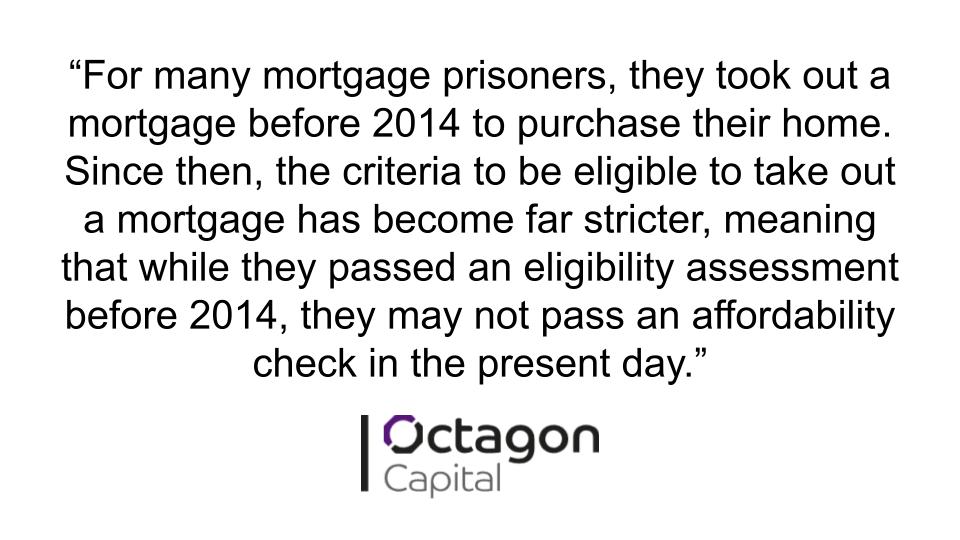What Can be Done to Help Mortgage Prisoners?
With the current cost of living crisis, many people feel like as soon as they see a better deal they need to take it. This applies for mortgages too, but unfortunately not for every mortgage holder. Some people find it incredibly difficult to make the switch with their mortgage from a bad deal to one with a better deal – essentially making them 'mortgage prisoners'.
Mortgage prisoners can become stuck in their current mortgage for a variety of reasons, and each case is different. However, in this Octagon Capital guide, we discuss what can be done to help mortgage prisoners swap to a better mortgage deal, as well as how to identify if you could be a 'mortgage prisoner'.
What is a Mortgage Prisoner?
A mortgage prisoner is a person who finds it incredibly difficult to switch their high cost mortgage to a new one with a better deal, despite being up-to-date with their mortgage re-payments.
For many mortgage prisoners, they took out a mortgage before 2014 to purchase their home. Since then, the criteria to be eligible to take out a mortgage has become far stricter, meaning that while they passed an eligibility assessment before 2014, they may not pass an affordability check in the present day. The newer affordability assessments consider both your income and your expenses to more accurately assess if you can afford to make the repayments on the mortgage in question.

Estimates from Money Saving Expert suggest that staggeringly, there could be up to 200,000 mortgage prisoners in the UK. These people are all borrowers who have taken out mortgages with now inactive firms who are no longer offering mortgages to new customers – borrowers in 'closed book' mortgages. The Financial Conduct Authority (FCA) suggests that of this group of mortgage prisoners in the UK, around one in three "should" be able to make the switch to a better deal.
It can be incredibly difficult to accurately report on the amount of mortgage prisoners at any one time, as many may not be aware that they could be getting a better deal elsewhere. As such, we've broken down how you can determine if you might in fact be a mortgage prisoner, unknowingly tied into a high-cost mortgage.
Am I a Mortgage Prisoner?
Many people only find out that they are in fact a mortgage prisoner when they decide to try and find a lower cost mortgage and realise that they are unable to do so.
When trying to figure out if you could be a mortgage prisoner, consider your answers to the following two questions:
- Did you purchase your home, or remortgage it, before the introduction of the stricter affordability rules in 2014 that we mentioned earlier?
- Have you been told in the past you can't switch to a more competitive, cheaper deal?
If you find yourself answering "yes" to both of these questions, there is a strong chance that you could be a mortgage prisoner.
It can be hard to wrap your head around mortgages and the process of changing your mortgage, let alone if you're a mortgage prisoner. We've included some information about the things that can help mortgage prisoners in their situation.
What Can Help Mortgage Prisoners?
The FCA introduced changes to the rules and regulations surrounding mortgages in October 2019, meaning some borrowers could be able to switch over to a more competitive and affordable mortgage. The FCA's rules check your mortgage payment history, rather than solely considering the affordability of your mortgage.
If this applies to you, you will have received an official letter before January 2020. This letter will confirm that you are unable to switch mortgages to a more affordable deal, and that you might be able to benefit from these changes to regulation. Please note: having received a letter does not mean you are automatically eligible to switch your mortgage to one with a different lender.
Do I qualify to switch mortgages under the new rules?
If you have received the letter confirming you are unable to switch mortgages to a better deal before January 2022 and apply to switch your mortgage, lenders will use different criteria to decide whether they will accept your application.
As we mentioned earlier, the FCA uses a different criteria to the one previously used, opting to consider a person'd mortgage payment history as well as their affordability. It's likely that lenders will want to know about your repayment history, as well as your repayment plan.
The criteria used to determine if you can swap your mortgage to a different lender vary from lender to lender, but according to Money Helper, might include: a copy of the 'mortgage prisoner' letter, a minimum of five years remaining on your mortgage, at least £50,000 remaining on your mortgage, a minimum property value of £60,000, a LTV of no more than 85%, not having a buy-to-let mortgage, no changes to who took out the original mortgage, no missed mortgage payments and a clear repayment plan.
What Are The Jobs Available at a Bridging Loans Provider?
The bridging loans industry is very fast growing, after all, the sector was worth £1 billion in 2011 and ten years later, it is estimated to be worth over £8 billion. With this comes many job opportunities and today, people may find more scope for working with a bridging loans provider or specialist lender, rather than working with a traditional bank or mortgage company. Below, Octagon Capital highlights some of the jobs and responsibilities you might find working with a bridging company.
- Customer services advisor
- Business development manager (BDM)
- Underwriter
- Marketing team
- Legals
- Mortgage administrator
- Finance analysts and controllers
- Compliance
- HR
- Directors
Customer services advisor
A bridging company will always have a team of people who oversee the customer service operations. This may include just answering standard queries from customers, answering the phones, offering initial quotes, following up enquiries and helping put key documents together.
Prior experience in the financial sector may be useful here, but a lot of the skills can be learned on the job. You will need people with good communication skills and confidence answering phone calls and dealing with queries or complaints. If you work in a regulated bridging environment, you will need to be more strict with following procedures and scripts, in line with regulation.
Whilst some bridging companies may have just one or a few customer service agents, you may find that it overlaps with other skills in administration or marketing. In some cases, you could always outsource this to specialist customer service centres such as Tieta or similar partners.

Business development manager (BDM)
A business development manager or BDM as it is commonly known is a sales role, with the responsibility to find new opportunities and bring in new business. A BDM would be good at speaking to new and existing partners, maintaining strong relationships with brokers that send regular deals and speaking to people at exhibitions and trade shows across the country.
Depending on the size of the firm, you may find that there are BDMs for specific regions, so that they can capture more of that specific market or become more well-known in that area. If they are on the road a lot and going from place to place, it might help if it is in the region of the South-West, or Midlands or a specific area.
BDMs will usually have a starting salary but may also work on commission and the successful completions of some deals.
Underwriter
The underwriters have a very important role within the organisation to assess the risk and rates of any customers and ultimately decide who is approved and who is not.
The underwriters will typically have a background in business, finance, law or economics and they will have very good analytical skills to assess risk and determine what rates are charged and what deals are approved - in order to make a profit.
Underwriters make key decisions and get the final say on who is accepted (along with the Directors).
The salaries for underwriters will typically be a lot higher, and this is something that you can learn by working in the organisation or you can study for this too. However, a lot of underwriters previously work in finance or law and have transferrable skills to take on this position.
Marketing team
The marketing team can be key for a bridging lender in order to convey a positive message and brand image. In a busy industry, a good marketing team can help the company stand out and generate good quality business.
A marketing department can be just one or multiple people and roles can include:
- Branding
- Brochures
- Exhibitions and displays
- Email and direct mail marketing
- Website design and optimisation
- Lead generation from online brokers
- Affiliates, digital and online search
- PR and press from local sources
- Awards applications and submissions
Legals
The legal department will play a crucial role to ensure the completion of any deals, making sure all regulatory and legal contracts are viable, taking into consideration the complexities of purchasing properties or land. The legal team will be responsible to liaising with the solicitors of the clients, passing over funds and checking all aspects of the property and deal so they can run smoothly.
You will ideally need to have qualified solicitor and lawyers to work in the legal department of a bridging loans company - with other roles such as property surveyors likely to be outsourced to a partner.

Mortgage administrator
The administration team will be responsible for gathering and collecting documentation from clients and partners, staying on top of all regulatory requirements and helping to process bridging deals as smoothly as possible.
Since every company will be different, no prior experience may be required and much of this could be learnt on the job, whilst any background working in admin or financial services would be welcomed.
Finance analysts and controllers
The financial analysts and controllers will be responsible for holding and distributing funds between lenders, investors, solicitors and customers. A background in banking and finance would be useful for this, although some roles can be acquired on the job. Other roles may overlap with underwriting or even paying invoices for partners and staff members.
Compliance
The compliance team may overlap with the legal department and will ensure that any activity is compliant and according to the regulation. To be compliant means that you will require written procedures for everything you do, including offering quotations, customer services, contracts, collections and more. A compliance team will be required to do regular training and also pass this on and teach this to other staff members in the organisation.
HR
For larger bridging firms, there may be someone or multiple people involved in HR (human resources). Their roles will include hiring and firing staff, finding new candidates, deploying employee benefit schemes, arranging team socials, dealing with any internal conflict or mediation and also salary reviews.
Directors
Whether it is the main director or commercial director, these are the bosses who have an overview of the entire organisation and ultimately decide what direction it takes and how it grows.
The role of directors is important for securing larger bridging clients and also networking at the highest level. The responsibility of investment and where they generate their funding from will be a key role of a director.
Ultimately, directors will make the final decision on loan approvals, hiring of staff and the overall vision of the company.
UK Home Sales Hit Record High
-
UK property sales were recorded at a 16-year high.
-
Average UK house prices have increased by 8.6%.
-
Statistics evidence how the stamp duty holiday turbocharged the market.
About 180,690 transactions took place during March, according to official figures from HMRC. This was twice the number seen in March 2020 and the highest and the highest number recorded since HMRC began publishing the data in 2005.
Data from the Office for National Statistics (ONS) confirmed that the market frenzy has driven up house prices. ONS data showed the average home in the UK to be priced at £250,000 in February, a £20,000 rise on the same month of last year.
The average house price in the UK increased at an annual growth rate of 8.6% (until February). This is the steepest increase in the property market since October 2014.
Why Have House Prices Risen?
This increase comes at a time when many feared for the sake of the property market. Coronavirus lockdowns around the country caused limited viewings, closed agency doors, and forced lenders and solicitors to work from home. Despite the market freeze, the figures evidence the tremendous bounce back. As everyone held their breath, the stamp duty holiday flew in to support the market.
In March, buyers and sellers were in a rush to complete deals before the end of the stamp duty holiday. In England and Northern Ireland, the tax threshold temporarily increased to £500,000, giving buyers savings of up to £15,000. In Wales and Scotland, the bracket went up to £250,000.
Buyers shot at the opportunity to complete deals before the deadline, as reflected in the sales figures.
The pandemic also prompted a reconsideration about what people want from their homes for many Britons. As operating from home became the norm, many found themselves in properties that did not suit their work lives. Buyers who began searching for larger homes and gardens have helped drive the market and raise average house prices.
Stats & Figures
HMRC's figures note that transactions jumped by 49.6% over March. 399,060 sales were made in the first quarter of the year, making it the busiest quarter since spring 2006.
The ONS figures placed the average price of a home in the UK at £250,000 in February, increasing £20,000 on the same month of last year.
- In England, the average price rose by 8.7% over the year to £268,000.
- Wales saw an 8.4% increase to £180,000.
- In Scotland, prices gained by 8% to £162,000.
- In Northern Ireland by 5.3% to £148,000.
The north-west of England recorded the highest annual growth with an 11.9% rise, closely followed by the East Midlands and Yorkshire and the Humber. London marked the lowest development in England, at an increase of 4.6%.
ONS reported a 9.1% growth in the average price of detached homes. Flats and maisonettes rose by 6.7% over the same time.
What's Next For The Property Market?
The property data collected is evidence of how the stamp duty holiday turbocharged the market. Although the tax holiday has ended, the government-backed 95% mortgage scheme launched on Monday and could help more first-time buyers get on the property ladder.
As lockdown restrictions relax and more homes go on the market, some property experts believe that expanded choice and growing consumer confidence could prompt a second surge.
Government Cracks Down On Second-Home Owners Avoiding Council Tax
- Changes made to the tax treatment of holiday lets
- Crackdown on 60,000 self-catering properties in England are registered for business rates
- Other changes stated in the Government's Tax policies and consultations publication?
The Government will tighten the rules to regulate second-home owners who are falsely claiming tax breaks.
The treasury became concerned that some people are claiming to let out their second home while putting minimal effort into doing so. This allows people to receive tax breaks that they are not entitled to.
Some second-home owners in the UK have avoided council tax on the properties by saying that they are holiday lets. The current rules allow them to be charged business rates. Moreover, a large proportion of these properties qualify for Small Business Rate Relief. Therefore, if the property has a rateable value of less than £12,000, they are fully tax-exempt, allowing for significant savings.
New Regulations
The Government plans to toughen the rules with the new move laid out in the Government's Tax policies and consultations publication. People who state that they manage a holiday rental will be required to prove that the property is rented out for a minimum of 140 days per year.
How Relevant Is This Issue?
Government statistics show:
- 60,000 self-catering properties in England are registered for business rates.
- 96% of these premises have a rateable value of less than £12,000 - likely qualifying for Small Business Rates Relief.
It is unknown how many of these are private second homes and how many are honest holiday lets. The new regulations aim to combat this uncertainty.
How Will This Affect Second-Home Owners?
Second-home owners who have been getting business rates will be obliged to guarantee that it is rented out for at least 140 days per year. They must prove to be genuine holiday lets if they want to continue receiving the lucrative tax break. Otherwise, they will now be required to pay council tax on their property.
Other changes made in the Government's Tax policies and consultations publication
Regulating second-home owners falsely claiming tax breaks was the most notable move in the tax policy document, but the publication also identified many other property-related changes.
The Government published proposals to start a consultation in 2022 on creating an additional tax on the largest residential property developers. The Government's new reporting requirements also evidenced plans to simplify inheritance tax. The Tax policies and consultations publication also laid out steps towards making rules on land and property VAT exemptions clearer.
A Third of New Homeowners Say COVID Has Helped Them Get On The Property Ladder
According to new research by Yes Homebuyers, a third of homeowners say that coronavirus lockdown restrictions have helped them onto the property ladder.
The study shines a positive light on the financial hardships of lockdown. For a third of homebuyers, the lockdowns have been a helping hand in realizing their homeownership goals. Although we are all eager to return to normality, it is clear that the coronavirus restrictions also have helped Britons save up for property. The study found that 27% of recent homebuyers say the lockdown restrictions helped them save the money to buy a property.
Why has COVID helped homebuyers get on the property ladder?
During the national lockdowns in the UK, many have had little else to spend their money on. Working from home and a halt to social activities has allowed some people to save money over the course of this year. On average, Brits are saving £140 each week by staying home during the lockdown. There have also been further savings up for grabs with the government's stamp duty holiday. Some have benefited from the unfortunate circumstances in which we have all found ourselves by managing to get a foot on the property ladder.
The research shows that:
- 46% of those questioned in the survey identified the hugely reduced social expenses as a help in buying their property.
- 33% said working from home helped save on commuting costs
- 10% cited reduced family expenses
- 6% noted an inheritance due to bereavement
- 5% saved money on rent by moving in with their parents during lockdown
Matthew Cooper, founder and managing director of Yes Homebuyers, stated: "There's no-one on the planet who wouldn't like to erase the last year from history, and the lockdown has been hard for so many people for a whole variety of reasons... At the same time, there have been some great stories of resolve, survival and adaptation emerging across all areas of life. This is indicative of our nation and how we come together when times are tough."
UK Named Hotspot For Overseas Property Investment
- The UK has been named a top hotspot for overseas investment in residential property in 2021.
- Why is investing in UK property so attractive?
- What are investors expecting from the year to come?
For many years, the UK property market has been a prime target for overseas investment, and this shows no sign of changing in 2021. More recently, property investors from Asia, Europe, and the US have taken a particular interest in UK property as a reliable investment opportunity.
In a survey by international law firm DLA Piper, they named the UK a prime global property investment hotspot.
The survey found that investors headquartered in China and the US listed the UK as the best place for investing in residential. Property investors from the UK, Germany, France, Spain, and Italy ranked the UK as the third-best place for property investment. On the whole, investors remain positive going into 2021.
Why is investing in UK property so attractive?
Foreign property investors view the UK market as a safe haven with preferable currency exchange rates and low mortgage rates.
Investors find British property appealing because of high demand and a shortfall in supply, significantly growing rental demand. The strong yields and attractive prices give the UK property investment solid long-term prospects for capital appreciation.
Stamp Duty Holiday
Since the stamp duty holiday came into place, foreign buyers and investors have been snapping up property across the UK well into the new year. Although the additional 2% stamp duty surcharge is set to return for overseas-based investors in April, experts feel it is unlikely to discourage overseas investors.
Value of Sterling
The fall in sterling is just one of the benefits that will keep overseas investors interested after the reintroduction of the stamp duty tax.
Visa Opportunities
Property experts predict a surge in interest from Hong Kong buyers and investors because of a new special visa. The new visa was opened to British National Overseas passport holders in Hong Kong on 31st January. Many Hong Kong residents will likely use this opportunity to emigrate to the UK and invest in property.
What are investors expecting from the year to come?
Although the global COVID-19 pandemic continues to bring uncertainty, investors remain optimistic about UK property investment.
The DLA Piper survey reported more than half of the 500 high-net-worth investors taking part felt optimistic about the European property investment market. Just 11% felt pessimistic about this years' prospects. Additionally, 33% said they wish to invest in UK property during 2021.
Another recent study by Property Master showed nearly half of buy-to-let investors in the UK are optimistic about the market in 2021. The statistics show that only 10% plan to leave the sector this year and nearly 70% said they do not plan to sell properties.
2021
Throughout 2021, the UK property market is likely to remain robust despite Brexit and Coronavirus uncertainties. Foreign investors are forecast to continue investing in UK property at substantial levels. The sector's resilience to political and economic difficulties has been evidenced in recent years and will allow overseas investors to persist confidently in investing in UK property.
Green property in 2021
- The Green Homes Grant has been extended
- Interest in green housing is increasing
- Homeowners have till 31st March 2021 to complete upgrades
In 2020, the government announced an extension of the Green Homes Grant, which attracts landlords to eco-friendly properties. The plan offers a grant to property owners to make eco-friendly renovations on their properties.
The aim is to encourage more property owners to install energy-efficient improvements—for example, insulation, heating, draught-proofing, and double and triple glazing. Renewable energy innovations, like heat pumps or solar panels, also qualify.
How does it work?
The Green Homes scheme offers funding for up to two-thirds of the improvement costs, to the value of £5,000 per household. Homeowners and landlords wishing to use the grant have until 31st March 2021 to get their upgrades completed.
What's the result?
The Green Homes Grant means that making energy efficiency improvements is more accessible. The government's extension of the grant has seen positive results alongside the public's growing awareness of environmental issues.
In 2021, almost 84% of British homeowners plan to address energy efficiency changes in their property, according to a study by City Plumbing.
Nearly 53% of households plan to invest in green measures specifically to reduce energy bills. The home improvements most usually chosen include upgrades to the cavity wall, loft, and underfloor insulation. Improving your property's insulation can have a significant impact on its energy performance.
Evan Maindonald, CEO and founder of MELT Property, believes that buyers are ready to embrace sustainable living.
"If you are looking to improve the energy efficiency of your home, a good first step would be to review your property's heating system. Old-fashioned heating systems will send utility bills rocketing and have a high carbon footprint. To reduce both, consider installing an Air Source or Ground Source Heat Pump."
Why landlords should invest in 'green' rental properties
There are numerous benefits and incentives for landlords to invest in green housing, and now couldn't be a better time.
More appealing buy-to-lets
Eco-friendly properties will help landlords make their buy-to-lets more appealing and add value to their properties.
Caters for the target tenant
Landlords who invest more in their properties to offer a place that caters to their target tenant see the most market success. Tenants are beginning to expect more from their rental properties, and as environmental issues prevail on people's minds, green housing is appealing to a wide range of tenants.
Eco-properties as an energy-efficient selling point
Landlords can now utilize eco-properties for their energy efficiency. As we all spend more time in our homes with coronavirus lockdowns, household bills go up. This will be particularly appealing for prospective tenants who are now working from home full-time.
Green mortgages as an added incentive
Lastly, green mortgages are gaining popularity. The UK population becoming increasingly eco-conscious has allowed ‘green mortgages’ to find their place in the mainstream market. The mortgages give borrowers special rates linked directly to the energy performance of their properties. This provides an added financial incentive for landlords and investors to focus on green credentials.
New leasehold reform: Will it make homeownership fairer?
- New leasehold reform will save millions of leaseholders tens of thousands of pounds
- What does the reform change?
- Will it make homeownership fairer?
What is the new leasehold reform?
New legislation that has been brought forward, will give leaseholders the right to extend their lease for 990 years at zero ground rent. The leasehold reform will save millions of leaseholders up to tens of thousands of pounds. The government described these measures as part of English property law's biggest reforms in 40 years.
Housing Secretary Robert Jenrick says: "Across the country, people are struggling to realise the dream of owning their own home but find the reality of being a leaseholder far too bureaucratic, burdensome and expensive.
"We want to reinforce the security that homeownership brings by changing forever the way we own homes and end some of the worst practices faced by homeowners."
What does the reform change?
The reform will give leaseholders the right to extend their lease by a maximum span of 990 years with zero ground rent. Previously, leaseholders of houses have only been able to extend their lease for 50 years at a time and had to pay ground rent.
Leaseholders have also been met with expensive charges to extend the lease. Some of these extra costs have now been abolished with the reform, such as the "marriage value". This required leaseholders to share information with the freeholder about potential profits from extending a lease.
A cap on ground rent, the cost paid when a leaseholder extends the lease or buys the freehold, will also be introduced. An online calculator will now make it easier for leaseholders to know how much it will cost to do either. This hopes to make the costs associated with a lease more transparent.
Will it make homeownership fairer?
While the proposed leasehold reform has much to support, many in the industry feel they need some more detailed information. There are concerns that the reform has created further uncertainty for leaseholders. Moreover, there is apprehension that the proposed actions could take years to become law.
However, for many in the property industry, there is a shared hope that the reform will make homeownership fairer and put an end to the ground rent scandal.
What is the ground rent scandal?
The ground rent scandal is one of the reasons why leasehold reform is so important. Objections to the unfair expenses on leasehold flats and homes sold with unclear clauses began some years ago. Some clauses involved freeholders increasing ground rent excessively. In some cases, leaseholders saw their rent double every ten years. The increased costs left some homeowners struggling to sell their property. As a result, properties with short-leases or high ground rents are often left vacant.
Mark Hayward, the chief policy advisor at Propertymark, discusses the organisation's research into the ground rent scandal:
"Our research' Leasehold: A Life Sentence' in 2018 found that 46 percent of leasehold house owners were unaware of the escalating ground rent when they purchased their property. Over one million households in the UK are sold through a leasehold, and this new legislation will go a long way to help thousands of homeowners caught in a leasehold trap."
Conclusion
Homeowners will see direct benefits from the government's leasehold reform. 4.5 million homeowners will save up to thousands to tens of thousands of pounds. Furthermore, the reform will allow leaseholders to buy a freehold for a lower price. Overall, homeownership costs will become cheaper, and property sales will be more straightforward.
Let's not forget about the benefits for properties with shorter leases. Properties with short-leases or high ground rents are sitting empty around the country as owners struggle to sell. Homebuyers will now become more open to purchasing properties with shorter leases leading to fewer stranded, vacant properties.
All in all, the leasehold reform is provides willingly received changes to many in the property industry. The only desires that remain are for details to be made explicitly clear and actions to be fulfilled promptly.
London Property Market 2021
- Londoners leave the capital
- Foreign investment to remain strong
- Tenant demand to increase
The development of the property market will principally rely on the UK's economic resurgence from the coronavirus. In 2021, the economy is forecast to grow by 5.3%, but the recovery still faces uncertainty.
The pandemic's ambiguity meant it was a challenging year for the property sector, and it's tough to predict how the market will prove in 2021. Despite the ongoing Brexit unpredictability, the outlook for 2021 is largely positive. Industry experts are optimistic that Brexit is not likely to have much of an impact on the housing market in the short term. This year, the London property market will see Londoners continue to leave the capital while investment from overseas remains strong. Tenant demand will begin to increase and, by the end of the year, the rate of rental decline will have slowed.
The London Exodus
The COVID crisis sparked a London exodus, with a sudden scramble to purchase homes on the outskirts of the capital. As the pandemic forced most of the nation to work from home, more and more people chose to leave London. As a result, commuter belts have widened around London and all major cities.

In 2021, the trend is set to continue with more Londoners realising the potential of working from a rural home or commuting once or twice a week. Estate agency Hamptons forecasts that the London exodus will continue for at least the first half of the new year but may slow down as house prices flatline.
Foreign Investment
Foreign investment in the capital is predicted to maintain strong levels in 2021.
Foreign investment from around the globe forms a significant share of London's property business. Despite the challenges London is facing, investors abroad have not forgotten the long-term appeal. Recent reports state London is the second-best place for property investment in Europe. The capital had climbed two spots from the previous year's 'Emerging Trends in Real Estate' report (PricewaterhouseCoopers and the Urban Land Institute).
Local and foreign investors alike have been closing on prime property during the stamp duty holiday. Many are raring to close deals before the additional 2% tax returns for international buyers in April. However, many industry experts are confident that the charge will not deter foreign investment.
Renters and Landlords in the Capital
In 2021, the tenancy market may improve in London.
Renters in London were at a shortage in 2020 as tenants encountered financial challenges. Job uncertainty, furlough wage reductions, and redundancies had their effect on the London rented sector. Supply increased substantially in the capital, and some landlords had to accept lower rent to avoid void periods. Central London saw rent fall by 20%, according to statistics from estate agents Chestertons. Other prime London locations saw 15% decreases, and rental prices in Greater London lessened by 4%.
This year, the number of properties available to rent will likely decline. Once restrictions begin to lift, demand is likely to pick up, and the rate of rental decline will lag. If this year sees the economy recover as anticipated, rent will likely resume growth over the course of 2022.
David Beard Comment - From Lending Expert - "Second Charge Lenders Still Have a Good Appetite"
Second charge lenders still have a good appetite, explains David Beard, the founder of Lending Expert, one of the UK's leading price comparison websites.
Beard explains that whilst the UK is in its third lockdown, the housing market remains open and property valuations can still take place, allowing applications to be processed and deals to be completed across second charge loans, mortgages, bridging loans and more.
David Beard, founder of Lending Expert, explained:
“While business levels were quite significantly effected during the first national lockdown in March 2020, it’s now “business as usual” during this third lockdown for the secured loans industry.”
“January 2021 is showing that many second charge lenders still have a good appetite to lend and borrowing rates and products have mostly remained unchanged. The key differences to note are during this third national lockdown is that the housing market has remained open and lenders are able to instruct surveyors for home valuations which is critical to successfully carry out secured lending and mortgage applications.”
“This time round there is no restriction on physical valuations and for over a decade the industry has offered a huge range of products available using Hometrack or similar desktop valuation models.”

Stamp duty deadline also likely to play a role
With the upcoming stamp duty deadline of 31st March 2021, this will certainly play a role in boosting mortgage applications and deals in Q1. With those properties under £500,000 in the UK incurring zero stamp duty, there is certainly an incentive for first-time buyers, homeowners and developers to make an application or complete on a purchase, giving them a saving of £15,000.
With the deadline around 8 weeks away, this will certainly be a busy time for borrowers, brokers and lenders and this will continue to drive the second charge and general mortgage market, certainly in Q1.
What remains after in Q2 is yet to be determined and it could result in a major house pricing crash or a surge in house prices too.
About second charges
Second charge loans are used by developers and homeowners as a way to raise additional funds on an existing mortgage. The amount you can borrow is a little less than your first mortgage and it is known as a second charge because it is the second priority after your first mortgage has been paid. For developers, second charges are used to pay off existing debts, renovations, building work or finance a new property. For homeowners, second mortgages are often used to raise funds for debt consolidation, school fees, weddings and more. There is always a risk of repossession if you cannot repay your loan on time, or you may have to give up equity in your first original property to the outstanding lender.










